MEMBER SPOTLIGHT MO BAR
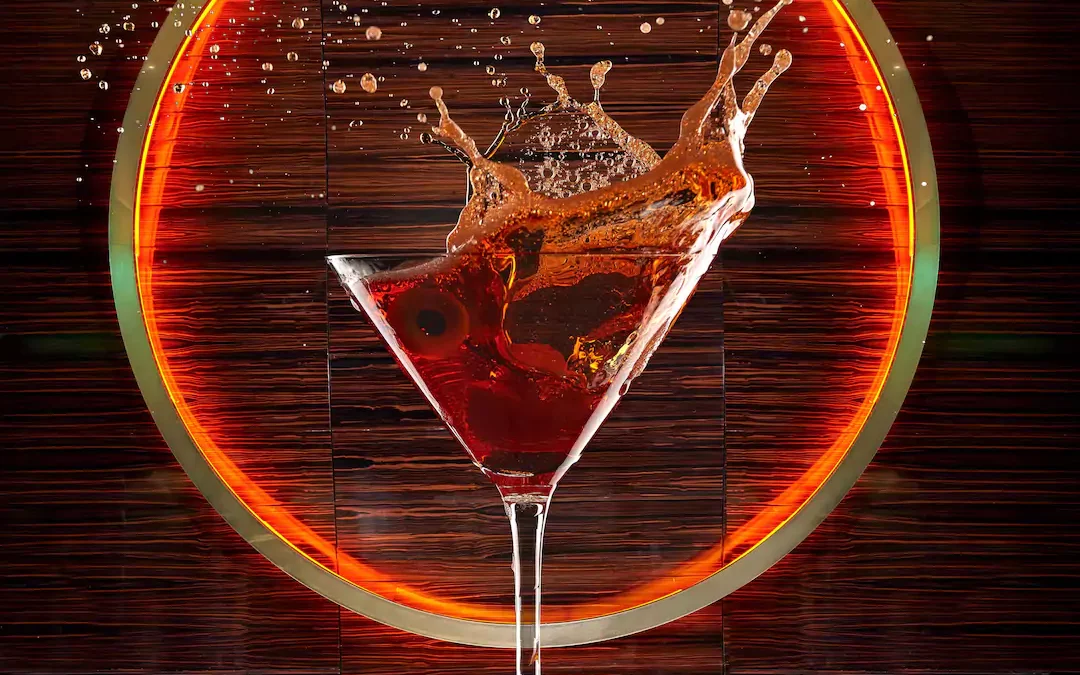
By Jade Chen
17 mins reading time
Breaking away from the midday buzz (and heat) of Hong Kong’s central business district, I step into MO Bar of the Landmark Mandarin Oriental, Hong Kong: a chic and lively hotspot at the heart of the city. Amid characteristic hues of green and red, the bar’s guests lounge nonchalantly on plush chairs, enjoying a midday cocktail (or two) during their afternoon rendezvous. Despite the current convivial atmosphere, the bar will transform into the animated nightspot it is known for in just a couple of hours.
Here for a rendezvous of my own, I settled down for a chat with MO Bar’s Assistant Manager Hanna Lee. We are joined by Janina Pilgrim, Chairwoman of the Landmark Mandarin Oriental Sustainability Committee, to discuss MO Bar’s inspiring sustainable initiatives and share what quickly proves to be a mutual enthusiasm for sustainability.
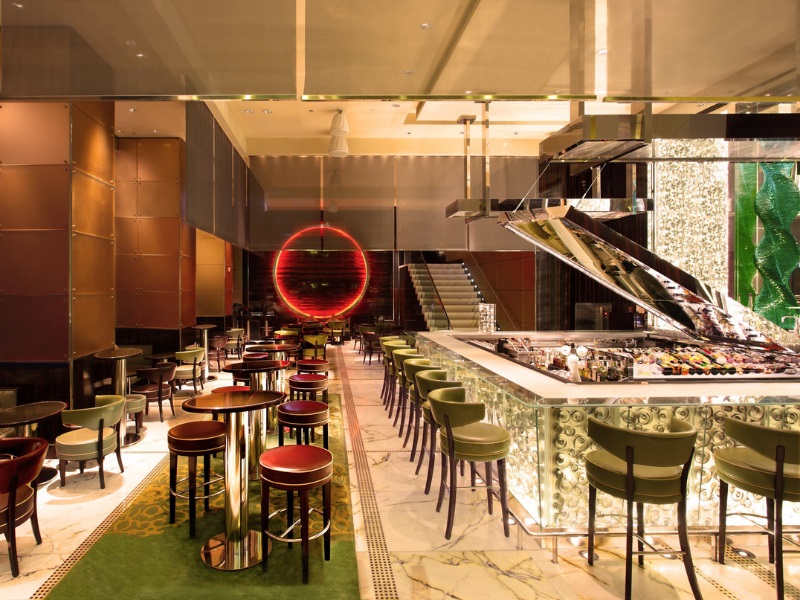
MO Bar’s stylish interior design
GOING THE EXTRA MILE
As a proud Member of Future Green and one of the few restaurants to achieve our acclaimed three-star sustainability rating, MO Bar has been trailblazing the path for a more sustainable food future. Yet describing the bar’s initiatives as just ‘green’ or ‘environmentally-friendly’ wouldn’t be doing them justice. With astounding ambition, the MO Bar team has moved beyond the fundamental notions of sustainability, incorporating a plethora of strategies that are both far-reaching and thorough. In addition to addressing the bar’s impact on the environment and climate, the team has also set ambitious goals that focus on social impact and public awareness, spearheading Hong Kong’s sustainability journey not just for themselves, but for other businesses in the F&B industry too.MO Bar’s dedication to sustainability is observed through actions big and small, all woven into the bar’s operations. Each detail is considered carefully, and the team is constantly searching for both areas of improvement and avenues to explore. To demonstrate this, Hanna points out an unlikely example: employees’ shoes. “Everyone here is wearing sneakers as part of their uniform,” Hanna notes. “It’s part of our sustainability mission: for everyone to be comfortable at work and able to move safely throughout the bar and staircases. Some of our employees are even wearing sustainable shoes made using recycled plastic— look!”.
Calling colleagues their internal guests, MO Bar is characterised by a strong team spirit that is built on principles of inclusivity and belonging. To align with their other sustainable initiatives, the bar’s internal perks include recreational allowances, healthy employee meals (including Green Monday meals), sustainability training, and many more.
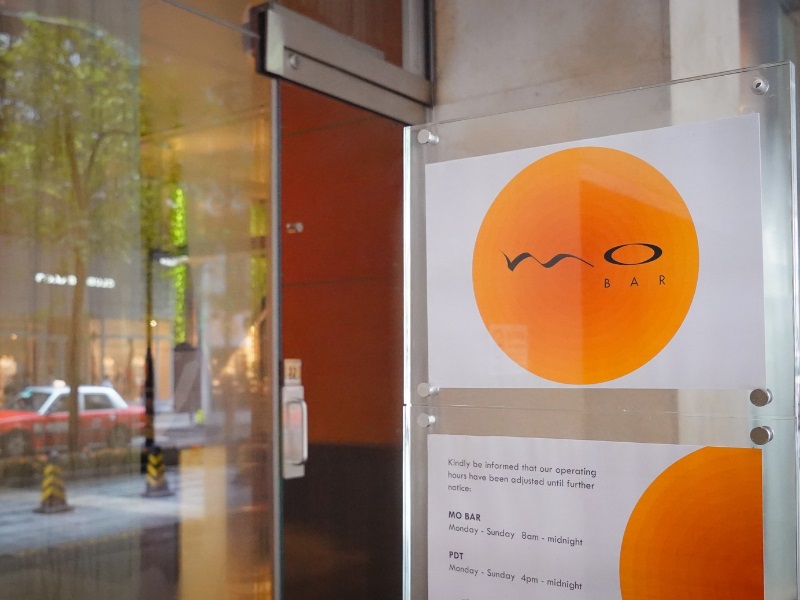
MO Bar’s entrance
FOOD FOR THOUGHT
Since it offers all-day dining as well as an extensive drinks list, elements such as sourcing and menu creation are undoubtedly an area of focus. One of Hanna’s proudest initiatives is MO Bar’s move towards a more plant-based menu. She hopes that by incorporating more plant-based and alternative protein options, the design of MO Bar’s menus can nudge diners to make healthier, more environmentally-friendly choices. A signature menu item, for example, is the Impossible burger: an environmentally-conscious and equally-delicious rendition of a classic dish.
For animal protein, sustainable sourcing is key. For example, seafood is supplied from those using only sustainable fishing practices. Certain species of fish, such as bluefin tuna, that are vulnerable to overfishing are completely excluded from the menu. As for meat and animal byproducts, high standards are already in place, and MO Bar offers only cage-free eggs. The bar’s chickens, sourced from the New Territories and New Zealand, are hormone-free and antibiotic-free too.
Moreover, fruits and vegetables are bought regionally (if not locally) as much as possible. To source seasonal and fresh food with a lower carbon price tag, MO Bar works with organic and urban farms in the New Territories. Whilst some local organic farms do have supply limitations (due to size), Hanna comments that they are great partners to work with, making insightful suggestions on what foods are seasonal and of good quality. A perk she discovered during the pandemic was that local sourcing (which doesn’t span across conflicting time zones) made it easier to maintain communication. Local farmers, Hanna notes, understand the culture better, and have a clear understanding of what the bar needs. The result is an experience that’s “almost like storytelling”. Weaving the source of the ingredient and its origin into the dish is great for communicating sustainability to customers.
HEARTS SET ON SUSTAINABILITY
For both Hanna and Janina, awareness of sustainability stemmed from personal observation and experience. Hanna, who grew up in South Korea, remembers recycling ever since she was a child in school. The act of separating different trash items happened almost instinctively and was very much a part of her routine. Yet this habit doesn’t exist in Hong Kong. Furthermore, Hanna describes the changes in weather and climate she has noticed. “Back then we had four seasons: spring, summer, autumn and winter. But now the summer and winter periods are much longer — it’s almost as if spring and autumn disappeared!”. “I think the world is changing, and not in a good way.” Janina, who grew up in Germany, resonated with Hanna’s story, noting how her consideration of sustainability began when she moved to Hong Kong. “Sometimes you do things by default and you’re not even aware of it,” she says. “In Germany, we by default recycle our trash into different categories. So when you go to someone else’s house and want to throw something away, you ask for a specific bin. When I came to Hong Kong, I remember I worked my first dinner shift and I had a glass bottle. I asked for the glass container, because that’s what I was used to, and someone pointed to the general trash. I said no, no, glass! And they pointed to the general trash again. I was shocked! That’s when I began to understand how much work there is to be done.”
Yet sustainability doesn’t come naturally to everyone, and Hanna mentions struggling to communicate the topic to her team. “My team was wondering why they needed to be sustainable, and why we needed to do this, do that… it was really hard to make them understand”. Inspired by her discovery of sustainability, which was very much hands-on and experiential, Hanna found an innovative solution to address her team’s queries. “We took them hiking on the peak and also visited the beach, collecting three huge boxes of garbage. When they saw the boxes in front of them, I think that’s when there was a moment of realisation.” But Hanna didn’t stop there. “We also have a program where employees take part in paid volunteer days. So yesterday for example we visited Food Angel in Sham Shui Po, chopping vegetables and packing food. Unfortunately, we couldn’t deliver the boxes we had packed, but on the way home I saw an old lady. She was eating on the street from a box that looked exactly like the ones I had packed. It means a lot to me, that the small grandma was eating the food I had packed”. “This is why we try to connect with the community and do more activities outside. We need to let the team understand first so that they can educate our guests as well”.
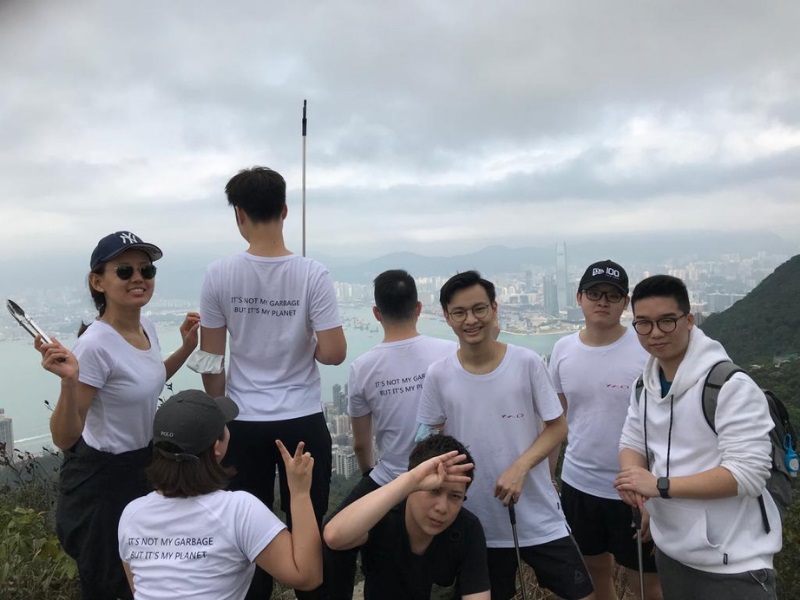
The MO Bar team’s hike to the peak
TAKING IT ONE DISH AT A TIME
Though sustainability has become an increasingly hot topic in recent years, it’s still not a subject that most diners have on their minds when they enter MO Bar for a meal. “A challenge I face is not having enough time to speak to guests about what we’re offering. With restaurants, you can introduce the menu and go through each course, but MO Bar is so fast-paced — people often come in for just one martini or dish”. To overcome this, Hanna includes an introduction of MO Bar’s sustainability efforts at the beginning of each menu (now offered via QR codes to avoid paper waste). An additional QR code is also provided for diners eager to find a more in-depth summary of the bar’s efforts.
Despite the team’s enthusiasm, not all diners are appreciative of MO Bar’s sustainability efforts. “We replaced our signature wagyu burger with the Impossible burger back in March of 2019. Even when I joined in August, people were still complaining about this— they wanted the ‘real’ burger and said it was the reason they came to MO Bar,” says Hanna. “So I tried offering them a complimentary burger, because sometimes people don’t know what Impossible meat is; they think you’re just giving them a veggie burger. After tasting it, some guests began to like the Impossible burger and returned to have it again. As opposed to usual burgers, which tend to be quite heavy (especially when you have to return to a seat in the office), they found that the Impossible burger was easier to digest!”.
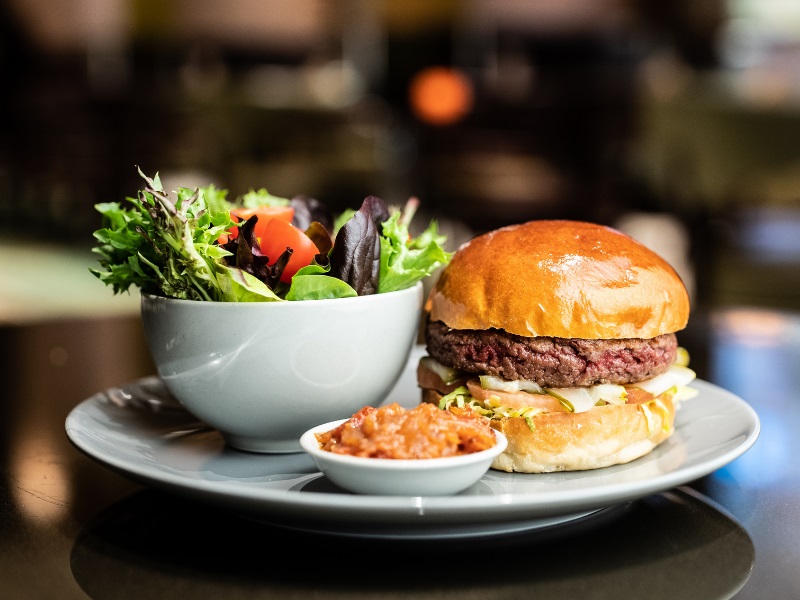
MO Bar’s Impossible burger looks just as good, if not better, than the original
Educating people about sustainability is quite the journey, but MO Bar has come up with a series of solutions to move the process along. One of these strategies is changing the menu quarterly, giving diners a wider variety of options. “We want guests to be aware,” Janina tells me. “We hope that guests will go to MO Bar because they know that we serve good quality food and because they know that we have all these other initiatives. But even if nobody notices we’ll continue, we still want to do the right thing”.
BUCKLING DOWN
Upon hearing about all of MO Bar’s (and Landmark Mandarin Oriental’s) sustainability initiatives, I can’t help but wonder: what is the driving force behind the team’s commitment to sustainability? Where did the team’s seemingly boundless supply of passion and determination come from and, more importantly, how can others learn from it?
After asking Hanna and Janina, I discovered an admirably straightforward answer: “our unwavering commitment to sustainability has just been part of our DNA at The Landmark for so many years. We have re-looked at every aspect of our operations, questioning how we can integrate sustainability. We are proud of what we do, and we are happy to communicate our commitments and achievements to our guests. Having the support from our leaders gives us the freedom to always ask ourselves “Is this the sustainable choice?” For 2022, the goal is to fully integrate this mindset into our hotel culture – colleagues should always be empowered to take the right decision when it comes to sustainability”.
Hanna and Janina both acknowledge that a few passionate and involved individuals — such as themselves and, of course, Richard Ekkebus (Future Green President and Director of Culinary Operations and Food and Beverage at The Landmark Mandarin Oriental) — can have a huge impact on the implementation of sustainability. “People like me and Hanna, we joined because of Landmark Mandarin Oriental’s sustainability mission and Richard Ekkebus’ vision. We want to be part of this effort, and I think that when you communicate and when you have the chance to work with similarly passionate people, it accelerates the whole movement,” says Janina. “It’s a snowball effect: once people are on board they attract more and more people who care.”
“We can make so much impact. In MO Bar, for example, we serve over 200 guests a day. These guests come from all walks of life, and we have the chance to communicate with and educate them. If you eat at MO Bar, you have to eat sustainably because there’s no alternative — everything is sustainable! Even if you’re not aware of sustainability, you’re still doing the right thing and that’s amazing. So every day, whether they know it or not, over 200 people eat something that is good for the environment and good for them”.
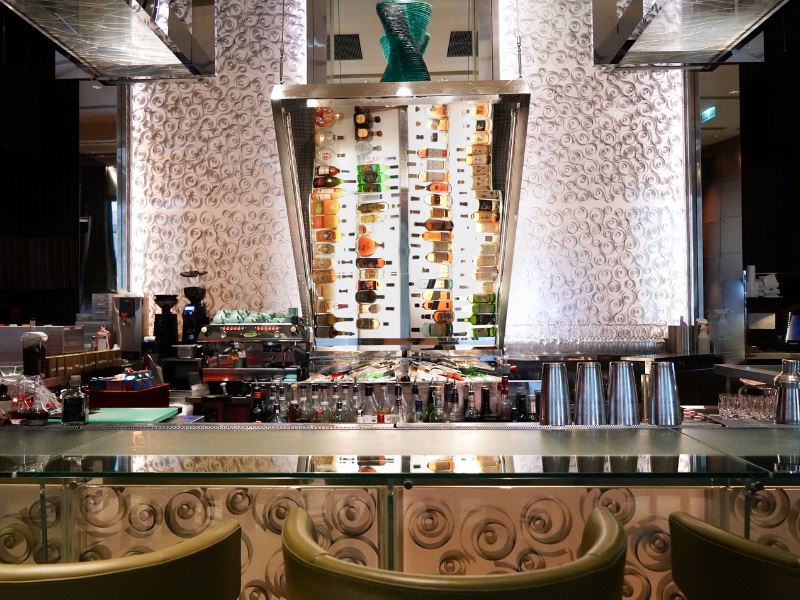
MO Bar’s dazzling design
TAKING THE (NOT SO CHALLENGING) FIRST STEP
Curious to know how other businesses can implement the same mindset, I ask Hanna and Janina, frontrunners in the foodservice industry’s sustainability movement, what messages they have for their peers. What insights do they have for foodservice businesses that have yet to hop on the sustainability train?
“It’s not even an option anymore; you have to do it now. The climate is changing, the environment is changing, just go to a beach in Hong Kong and see how much plastic there is! Look around, look at any video of the ocean or of dying coral reefs. There are so many issues, and sustainability just isn’t an option anymore,” says Janina. “If you’re thinking of starting, you should’ve started 6 months ago. I understand that it’s not an easy journey but, at this point, it’s the right thing to do.”
Hanna and Janina argue that embarking on a sustainability journey is not as challenging as it seems. As Hanna tells me, there are a plethora of strategies and measures that restaurants can choose from: whether that be sourcing food in the right way, altering menus, or just implementing small and feasible switches. “When people come to MO Bar they’re surprised as they don’t know that a bar can be sustainable too. But we are! We partner with Eco Spirits, for example, and source responsible vanilla and local fruit and honey for our beverages. You can start with one aspect first, maybe food or drink, and then slowly begin to improve and work on it”.
Janina agrees with Hanna and tells me that help is available so long as you’re willing to take the first step. After having worked on sustainability for so many years, Landmark Mandarin Oriental has built up a network, making it easier for it to pursue sustainability. Yet other restaurants can do the same. “The sustainability community, which includes Future Green and other organisations, is so open to sharing. I went to a conference this morning and when someone asked a question, six people jumped up and were like oh, I can help you, I have this contact and that contact… Everyone wants you to do well and there is no competition because, at the end of the day, we’re all saving the same planet, so the more sustainable you are the better.” “There are enough people out there that can help you — all you need to do is start”.
THE COST BENEFIT ANALYSIS
Like all subjects worth considering in our world, sustainability is multi-dimensional, with undeniable benefits but perhaps drawbacks as well. As Hanna said, some customers are not as keen to make compromises. And of course, sustainability is generally seen as an expensive choice— one that only certain businesses have the luxury to think about. Drawing on Hanna and Janina’s expertise, I try to analyse the tradeoff between sustainability and business, and find out what’s really holding businesses back.
Janina tells me that sustainability does come with costs, and “that’s just the hard truth of the matter”. “But now that more and more restaurants are becoming aware and more and more people are joining the movement, it becomes easier. There are more options available, and the space is becoming more competitive”. Moreover, tackling sustainability isn’t confined to a strict set of measures. Some of the choices businesses can make don’t have to be costly — in fact, they don’t have to cost anything at all! For example, by charging diners (instead of restaurants) a fee to offset their carbon emissions, Zero Footprint Asia gives foodservice businesses the chance to make their operations more eco-friendly without additional cost.
Other strategies that are smaller in scale can also be effective starting points. For example, MO Bar separates their coffee grounds so that the grounds can be picked up by local farmers to reuse as composting material. Eggshells are treated the same way, providing a sustainable solution that doesn’t come with a price tag. All that is needed, Janina explains, are a few pointed conversations: “start to put the word out there that you’re interested and people will naturally come to you. You can start with one part, then tackle another area later on when you have more resources”.
Building on this, Hanna notes that there are so many channels that foodservice businesses can use to find help. One of these is Fouture Green, whilst another is simply the internal team: “here at MO Bar, we brainstorm together often. Now that my team is more aware of sustainability, they come to me with ideas as well, saying look Hanna, this is plastic, and here’s how we can replace it… Starting from small things can make a huge difference”.
CATCHING UP AND PUSHING ON
Despite initially lagging in the global sustainability movement, Hanna and Janina observe that Hong Kong is quickly catching up. Hanna comments on the plastic bottle recycling machines that are popping up across the city, noting how she’s made it part of her routine to drop off her used plastic bottles. Meanwhile, Janina notes that promising new policies are set to be enforced, providing some encouraging news for the future. “Mindsets are changing,” Janina observes, noting how “one thing I love about people in Hong Kong is that they’re so quick to adapt. Once something new is passed, everyone is immediately on board.” As Janina notes, conversations about sustainability are on the rise, and Hong Kong is moving on the right track. “It’s a slow but sure process,” she says.
Though Landmark Mandarin Oriental is already quite far along on its sustainability journey, both Hanna and Janina don’t plan to stop anytime soon. When asked about future plans, Hanna recalls the process of completing Future Green’s (formerly Food Made Good HK) sustainability audit, telling me how it helped the team cement its vision for the future. “We thought we knew a lot about sustainability, but going through all the questions showed us how much we can still do. To complete the rating we conducted numerous brainstorms, and I had to do fact checks and speak with the team. Now, I can confidently tell everyone what we have done and what we can work on, and everyone has a clear view of where MO Bar’s sustainability journey is going next”. Other restaurants in Landmark Mandarin Oriental (such as Amber and Somm) have similarly completed Future Green’s (formerly Food Made Good HK) ratings, and Janina remarks that the ratings have given each restaurant “inspiration to implement new things”.
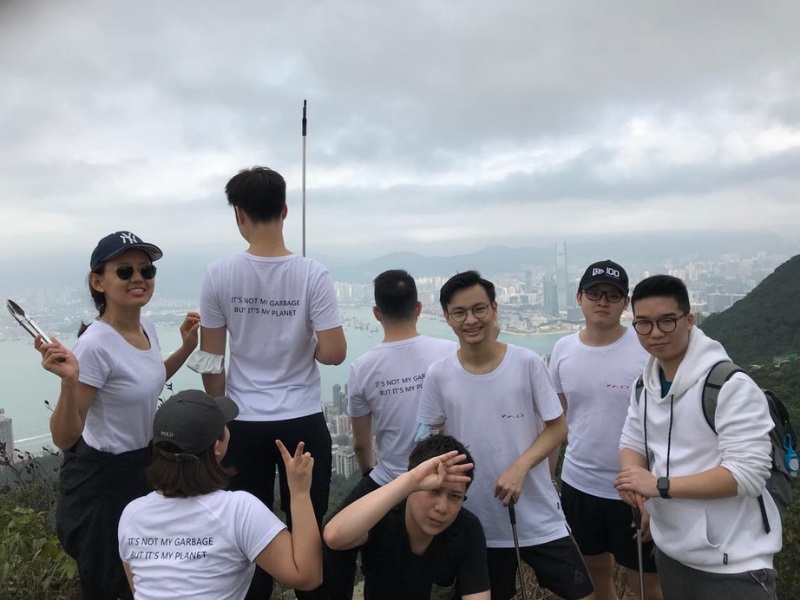
The MO Bar team
Hanna’s vision for 2022 and beyond is to continue educating her team. “I want all my colleagues to be aware of what we’re doing. A lot is going on and we have meetings about sustainability all the time. Everything is worth it, and I hope I can show everyone why what we’re doing is important and how it’s making a change. Because it really does make a difference”. As for the wider Landmark Mandarin Oriental group, Janina tells me the hotel is hosting an internal competition, where colleagues will submit their sustainability ideas. “We want to bring the issue to the forefront of everyone’s minds,” she tells me.
Thanks to people like Hanna and Janina, the drive for sustainability is accelerating rapidly. Like both of them say, “it all comes automatically. Just changing one person’s mindset can bring huge amounts of change; if we all do the right thing and talk about it too then I’m sure we’ll see positive transformations across the board”.
For now, feel free to stop by for an Impossible burger at MO Bar. Who knows — it may just become your new go-to meal.
To learn more about MO Bar head to their website here.
If you make sustainable products suitable for foodservice please get in touch about Future Green Membeship and lets see what possibilities lie ahead in normalising sustainability!
Interested in more?
2024
We’re Hiring – Marketing Interns Needed!
2024
Reflections from the Future Green Unconference 2.0: A Journey Towards Sustainable Food Systems
2024
SOURCING SEAFOOD RESPONSIBLY IS THE TOPIC OF OUR APRIL 2024 MEMBERS MONTHLY MEETUP
2024
REDUCE, REUSE, AND RECYCLE IS THE TOPIC OF OUR MARCH 2024 MEMBERS MONTHLY MEETUP
2024
PLANT-FORWARD, LESS, AND BETTER MEAT IS THE TOPIC OF OUR FEBRUARY 2024 MEMBERS MONTHLY MEETUP
2024
Marketing Coordinator
2024
The Recycling Crisis: Why Hong Kong Must Prioritise Reducing over Recycling
2024